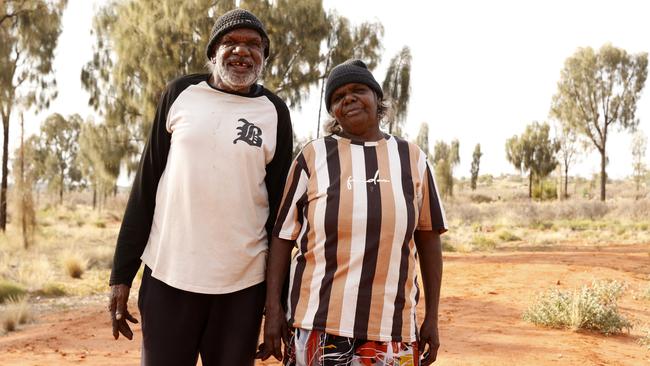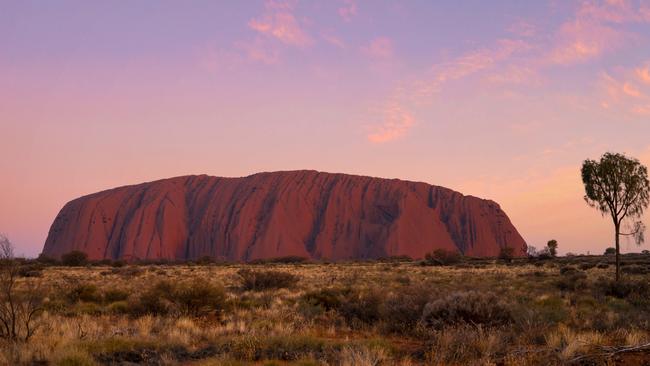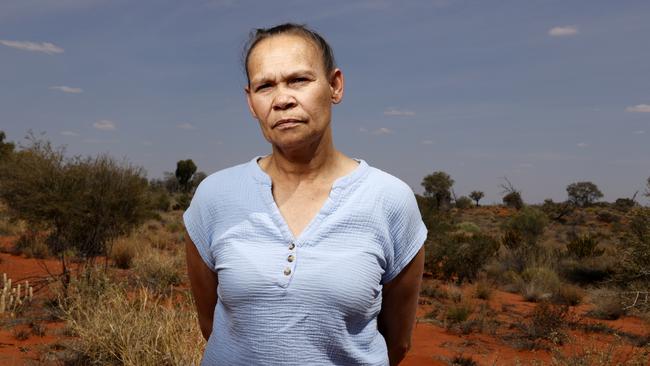Voice 2023: Red Centre locals don’t know about referendum vote
SPECIAL INVESTIGATION: At the very spot where the Uluru Statement from the Heart was written, most locals say they know nothing about the proposed Voice to Parliament.
NSW
Don't miss out on the headlines from NSW. Followed categories will be added to My News.
The sacred rock Uluru has been invoked as the birthplace of the upcoming referendum but here — in the heart of the nation — some locals say they don’t know what the vote is all about or have any knowledge of the proposed Voice to Parliament.
The Daily Telegraph travelled to Yulara, the tiny resort town beside Uluru, to ask locals from the nearby Aboriginal towns like Imanpa and Mutitjulu for their views on the referendum.
It was here, after all, that a convention of Indigenous leaders met in 2017 and signed the Uluru Statement from the Heart which called for a Voice to Parliament.
Access to Indigenous locals was limited — in some cases barred completely — by multiple layers of bureaucracy.
But The Telegraph did meet a dozen Aboriginal community members over a number of days, like Mutitjulu couple Jefferey Curtis and Evelyn Aiken, who were not aware of the Voice or the Uluru Statement from the Heart.
“We don’t know (what it is),” Ms Aiken said.
Asked if she recalled the 2017 meeting, she said “I don’t remember that”.

They said the chair of their community’s management committee may know more.
When attempts were made to contact the board, The Telegraph was told the chair was on leave and no other members were available to speak.
Media are also banned from entering the Mutitjulu township without being granted a permit, which could not be given until the committee met again next month, just prior to the referendum.
Mutitjulu’s traditional owner Sammy Wilson has previously said he supports the Voice, but others from the region like elder Murray George have opposed the statement and its proposed Voice.
Underneath the squabbles from the community’s more senior members, the Telegraph discovered the sentiment was not of support or opposition — it was apathy.
Two other women from Mutitjulu, who did not wish to give their names, did not recognise the proposal of a Voice, with one asking “where is it happening?”
Nor did they recall the statement signed in 2017 calling for a Voice, a truth-telling commission and a First Nations treaty.
Four residents from the town of Imanpa said they did not even recognise the concept of a Voice to Parliament. “We don’t know. What is that?” one resident said.

Mike Tucker, who is the principal of the independent school Nyangatjatjara College, said there had been limited exposure to the referendum debate in the region.
“We have done some classroom work talking about both sides of the argument but we don’t necessarily get involved with it in a political sense,” he said.
“Our exposure is quite limited here, in as much as there is plenty of stuff on the television but if you don’t have a television or watch it, you won’t see a whole lot on it.”
However, Mr Tucker said local groups like Empowered Communities, NPY Women’s Council and the Central Land Council had promoted a Yes vote.
NPY Women’s Council said there were currently 100 women meeting in Pipalyatjara near the tri-state border, who recently unanimously supported the Voice proposal with a resounding Yes, or “Uwa” in the local language.

Empowered Communities said they had held numerous community meetings and made presentations to community leaders, including in Mutitjulu, Imanpa and Finke.
Central Land Council Chief Executive Les Turner said: “Since early May our Voice team have held 72 information meetings about the voice across the southern half of the Northern Territory, attended by around 2300 people, including traditional owners of the Uluru Kata-Tjuta National Park.”
However, a spokesperson for the powerful Ayres Rock Resort, which owns and operates the entire town of Yulara, told The Telegraph they could not speak on the referendum issue and neither could resort staff.
Less than a month out from the referendum, there was no mention of the Voice to Parliament at the resort’s many public venues.
In fact, the extent of the referendum’s promotion at Central Australia’s iconic holiday town was one tourist wearing a Yes T-shirt.
Indigenous woman Margaret Geebung moved from Brisbane to work at the Erldundna Roadhouse, about two hours from Uluru, and does not support the Voice.
The Telegraph witnessed her asking Indigenous customers — as she often does — for their opinion on the referendum and none knew what it was.
“I think really it’s a load of crap. We have people already in parliament, we already have someone to talk for us but it’s not going to give us what we want, the treaty,” she said.
“I get a lot of locals, a lot that come through here … a lot of them don’t even have proper living quarters, you know. Where they are, they don’t even have proper water supply.
“A lot of locals don’t know what it is.”
Ms Geebung wanted Australians to understand the true history of First Nations people and for a treaty to be signed, but does not believe the Voice would achieve that outcome.
Prime Minister Anthony Albanese has repeatedly refused to be drawn into whether a Voice would result in a First Nations treaty and the truth-telling Makarata Commission, but the government has said it is committed to implementing the Uluru Statement from the Heart in full — which includes both the elements Ms Geebung is calling for.
But she remains unconvinced about the referendum.
“It’s all just for the government. It’s going to separate the Indigenous to the non-Indigenous, it really is,” she said.
Non-Indigenous locals who had lived in the area for years told The Telegraph they feared the Voice would split the community. Speaking anonymously, fearing repercussions from local authorities, one local said the impact of the Voice in Central Australia would be “divisive”, while another said it would add another layer of bureaucracy in a part of the country where land councils and other bodies already took weeks and months to process decisions.





